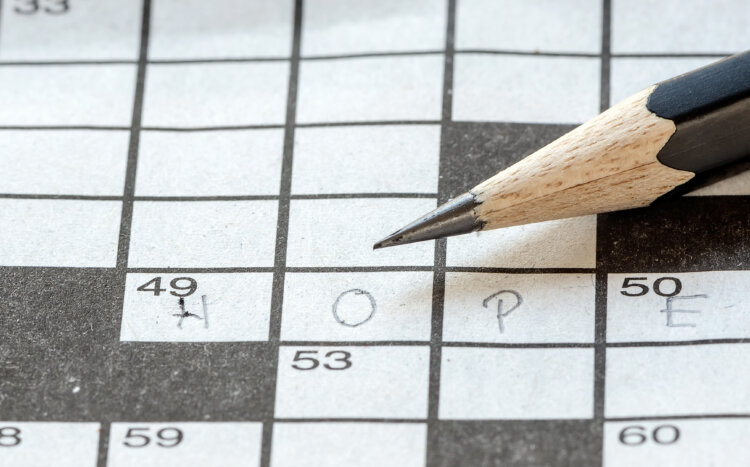
I was a young teen when I started doing crosswords with my mom. This is how we did crosswords: in pencil, with an eraser on the end, so you could misspell all you want. (Miscreant only has 9 letters? We spelled it with 10, so it could work in 5 across.) We crossed out the numbers in the clues because we worked haphazardly, sometimes guessing, usually reading down through all the clues but then going back to the fun ones or the easy corners. Writing in lowercase or upper, didn’t matter, we just tried not to smudge or erase so much you rip a hole in the newsprint. We never looked anything up, just waited for the answers in the next day’s paper.
When my sister moved back from Kentucky, we gained a science and SNL expert (I brought to the table Spanish language and classic literature), but we had to disallow our husbands from helping because they didn’t cross out clue numbers when they filled in answers—and they knew too much.
In 2008, my father had a heart attack while we were on vacation in Delaware, and we spent about two weeks in a hospital in Lewes. It seemed wrong to sit on the beach and wait for news on his health, or even take a break and walk the nearby streets, so we spent long hours in the waiting room and his hospital room, curled up in sweatshirts and drinking stale coffee. We tried to read the books we brought along but couldn’t focus. Instead of leading us through the characterizations and plot, all the words faded away into the soft puffs from the ventilator and were replaced by the beeps from the monitors.
One day the nursing staff convinced us nothing would happen while we were gone, so, feeling guilty, we left my dad’s bedside and went to eat at a nearby deli. It was an out-of-body experience, ordering, chewing, swallowing, and paying, all the while pretending we were a normal trio out for lunch instead of a worried three fearing and expecting the worst at any minute.
Back at the hospital, we stared open-mouthed at the surgeon who said family should be banned from the hospital room in these cases until there was news. In retrospect and hypothetically, not a bad idea. In reality, not so practical. What are you supposed to do while you wait to find out whether someone is going to recover?
Crosswords, it turns out, were the answer, and they got us through those rough weeks and the following months as my dad recuperated. We could sit in the chilly hospital room with the daily crossword, passing it back and forth, asking each other if we could remember Michael Phelps’ singular achievement at the 2008 Olympics, calling out the answers to clever clues when they dawned on us, and we could take the puzzle with us half-finished when we left at night.
Crosswords drew us together—my mom, my sister, and I—and gave us something to do to keep busy on those days we felt like bystanders.
After a transfer to a hospital closer to home and a few months in rehab, my dad was discharged and crosswords relinquished their elevated status as a symbol of sanity in lives upended by a heart attack. They returned to their previous place as brain-teasers in our everyday lives, something we could do if we had the time to spare.
Crosswords, it turns out, were the answer, and they got us through those rough weeks and the following months.
My dad never liked to do crosswords, but he was a good source of arcane knowledge about old TV shows or car racing. My brothers came in handy, too, with the names of ball players and winning teams. It doesn’t count as looking something up if you ask someone who’s sitting in the same room, after all.
That house my dad recovered in is long gone and my mother passed away two years ago, but every once in a while I still work on the crossword like we used to. Although my husband has a crossword app, I haven’t been able to go digital when it comes to crosswords. I like folding the newspaper into a raggedy rectangle, searching the pencil cup for the sharpest one, and running my finger down the list of clues. Best of all, even better than finishing a puzzle, I like tossing it aside when I get stuck or throwing it in the recycle bin when I’ve given up.
I can still hear my mom’s frustration when she would read the answers the next day. Crosswords you needed symbols to complete or ones that squeezed more than one letter in a box really vexed her. She all but took offense sometimes, as if the puzzle creator had cheated her personally. I love that I can pick up today’s crossword and reminisce about my mom and even remember those dark days we got through thanks to the crosswords.
My older daughter is almost at the age when she can start doing crosswords. I can’t wait till we can take turns with the crossword and reminisce with her aunt over Grandma’s creative spelling, love of the Olympics, and endless store of movie trivia. I’ll keep the pencils sharpened.


Grok Nation Comment Policy
We welcome thoughtful, grokky comments—keep your negativity and spam to yourself. Please read our Comment Policy before commenting.